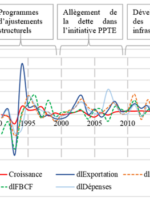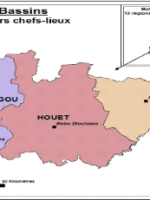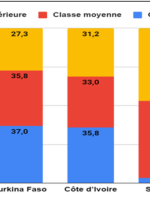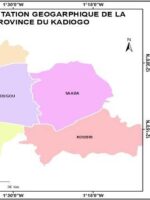‘The world is changing… the world is changing…’ Regulations, stakeholders and perceptions surrounding abortion in the south-west part of Côte d’Ivoire
Département d’Anthropologie et de Sociologie,
Université Alassane Ouattara, Côte d’Ivoire
Email: massissia@yahoo.fr
Orcid id: https://orcid.org/0009-0000-5869-9588
Résumé: L’interdiction de l’avortement en Côte d’Ivoire a contribué à accroître la disponibilité des offres de services d’avortements clandestins. En raison de cette législation, il existe en effet une large palette de services d’avortements clandestins avec une forte présence de médicaments d’origine chinoise dans les villes de Soubré et Méagui (sud-ouest de la côte d’Ivoire). Dans ce contexte de pratique généralisée des avortements clandestins, l’article fait une analyse de l’application de la loi sur l’avortement au niveau périphérique notamment sous l’angle de son application sélective et de la généralisation du phénomène. L’objectif du présent article est d’analyser l’écart qui existe entre les pratiques d’avortements clandestins observées en Côte d’Ivoire et le cadre institutionnel et légal mis en place pour lutter contre le phénomène ainsi que les différentes perceptions de la réglementation sur l’avortement.
Mots-clé: Avortements clandestins, Réglementation, Acteurs, Dynamiques.
Abstract: The ban on abortion in Côte d’Ivoire has helped to increase the availability of clandestine abortion services. As a result of this legislation, there is a wide range of clandestine abortion services, with a strong presence of medicines of Chinese origin in the towns of Soubré and Méagui (south-west Côte d’Ivoire). Against this backdrop of widespread clandestine abortion, the article analyses the application of the law on abortion at the peripheral level, particularly from the angle of its selective application and the generalisation of the phenomenon. The aim of this article is to understand the existing gap between clandestine abortion practices observed in south-west Côte d’Ivoire and the institutional arrangements put in place to fight against abortion, as well as the emerging positions in the public arena around the regulation of abortion.
Keywords : Clandestine abortions, Regulation, Stakeholders, Dynamics.
Références bibliographiques
Adisah-Atta, I. & Emeka, E. D. (2019). Justification of Abortion in West Africa and Interplay of Sociodemographic Predictors: A Comparative Study of Ghana and Nigeria. Sage Open , January-March, 1-9.https://doi.org/10.1177/2158244019834368
Aniteye, P., & Mayhew, S. (2019). Globalisation and Transition in abortion care in Ghana. BMC Health Services Research, 19 (185), 1‑12. https://doi.org/10.1186/s12913-019-4010-8
Atakro, C. A., Addo, S., Aboagye, J. S., Amoa-Gyarteng, K. G., Sarpong, T., & Adatara, P. (2019). Contributing factors to unsafe abortion practices among women of reproductive age at selected district hospitals in the Ashanti region of Ghana. Women’s Health, 19(60), 1‑17.
Bailly, C. (2024). Stratégies d’accès à l’offre clandestine d’avortement en Côte d’Ivoire. Pensées Genre. Penser autrement, 4(1), 186‑204.
Bajos, N., & Ferrand, M. (2011). De l’interdiction au contrôle : Les enjeux contemporains de la légalisation de l’avortement. Revue Française des Affaires Sociales, 1, 42‑60.
Diaw, A. (2023). Loi sur la santé de la reproduction en Côte d’Ivoire : On dit quoi ? 100 ans après où en sommes-nous? Engender Health.
Ensea. (2018). Enquête PMA2020 sur l’avortement en Côte d’Ivoire- Résultats clés 2018. https://www.pmadata.org/sites/default/files/data_product_results/PMA2020-Cote%20d%E2%80%99Ivoire-AbortionModule_Brief-FR_0.pdf
Guignard, L. (2017). Résistances catholiques au protocole de Maputo. Mobilisations et controverses autour de la libéralisation de l’avortement en Afrique. Genre, Sexualité et Sociétes, 18, 1‑18. HYPERLINK « https://doi.org/10.4000/gss.4076 » https://doi.org/10.4000/gss.4076
Guillaume, A., & Rossier, C. (2018). L’avortement dans le monde, état des lieux des législations, mesures, tendances et conséquences. Population, 2(73), 225‑322. HYPERLINK « https://doi.org/10.3917/popu.1802.0225 » https://doi.org/10.3917/popu.1802.0225
Hassentfuel P. (2011). Sociologie politique : l’action publique 2011. Armand Colin, 2011. .43-64.
N’Bouké, A., Calves, A., & Lardoux, S. (2016). Facteurs associés au recours à l’avortement à Lomé (Togo) : Analyse d’une séquence d’étapes menant à l’avortement. Cahier Québecois de Démographie, 45, 216‑246. HYPERLINK « https://doi.org/10.7202/1040396ar » https://doi.org/10.7202/1040396
N’Diaye M. & Bernard-Maugiron, N.(2021). Redéfinition des discours et pratiques militantes. Femmes et droits dans les afriques musulmanes. Cahier d’études africaines, 242,307-329. https://10.4000/etudesafricaines.34124
Ngwena, C. (2013). Access to safe abortion as a human in the african region : Lessons from emerging jurisprudence of un treatymonitoring bodies. South African Journal on Human Rights, 29, 399‑428. https://doi.org/10.1080/19962126.2013.11865080
Ouattara, F. & Storeng, K. T. (2014) L’avortement volontaire au Burkina Faso : quand les réponses techniques permettent d’éviter de traiter un problème social. Autrepart (70),109-124
Ouattara, F. (2014). Comment mettre sur agenda un problème public intime et sensible ?: Dilemmes et inconforts des acteurs autour de l’avortement au Burkina Faso. Fatoumata Ouattara. Bulletin de l’APAD, Hors série n°21 HYPERLINK « https://doi.org/10.4000/anthropodev.1305 » https://doi.org/10.4000/anthropodev.1305
Ouedraogo, R. (2014). Face à l’avortement : Exigences éthiques et dilemme moral à Ouagadougou. Anthropologie et Développement, 40‑41, 123‑141. HYPERLINK « https://doi.org/10.4000/anthropodev.306 » https://doi.org/10.4000/anthropodev.306
Rossier, C. (2007). Attitudes towards abortion and contraception in rural and urban Burkina Faso. Demographic Research, 17(2), 23‑58. https://doi.org/10.4054/DemRes.2007.17.2
Tadele, G., Haukane, H., Blystad, A., & Moland, K. M. (2019). ‘An uneasy compromise’ : Strategies and dilemmas in realizing a permissive abortion law in Ethiopia. International Journal of equity in health, 18(139), 1‑13. https://doi.org/10.1186/s12939-019-1017-z
Union Africaine, (2003). Protocole à la charte africaine des droits de l’homme et des peuples et des femmes. Union Africaine. https://au.int/sites/default/files/treaties/37077-treaty-0027_-_protocol_to_the_african_charter_on_human_and_peoples_rights_on_the_rights_of_women_in_africa_f.pdf
Whitaker, C., & Germain, A. (1999). Safe abortion in Africa : Ending the silence and starting a movement. African Journal of reproductive Health, 3(2), 7‑14. https://doi.org/10.2307/3583356






